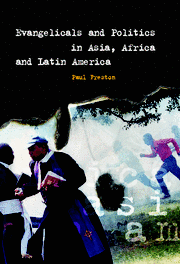Book contents
- Frontmatter
- Contents
- Foreword by David Martin
- Acknowledgements
- List of abbreviations
- Introduction
- PART ONE BRAZIL
- PART TWO ASIA
- PART THREE AFRICA
- 9 Sudan
- 10 Angola
- 11 Mozambique
- 12 Zimbabwe
- 13 Malawi
- 14 Rwanda
- 15 Uganda
- 16 Ghana
- 17 Kenya
- 18 Zambia
- 19 South Africa
- 20 Nigeria
- PART FOUR SPANISH-SPEAKING LATIN AMERICA
- Conclusion
- Bibliography
- Index
- Frontmatter
- Contents
- Foreword by David Martin
- Acknowledgements
- List of abbreviations
- Introduction
- PART ONE BRAZIL
- PART TWO ASIA
- PART THREE AFRICA
- 9 Sudan
- 10 Angola
- 11 Mozambique
- 12 Zimbabwe
- 13 Malawi
- 14 Rwanda
- 15 Uganda
- 16 Ghana
- 17 Kenya
- 18 Zambia
- 19 South Africa
- 20 Nigeria
- PART FOUR SPANISH-SPEAKING LATIN AMERICA
- Conclusion
- Bibliography
- Index
Summary
Information is somewhat patchy on Rwanda as far as evangelical involvement in (unfortunately the word is probably correct) and reaction to the genocide of 1994 are concerned. The importance of Rwanda for our study is that it was the cradle of one of the great evangelical revivals, the East African Revival of the 1930s and early 1940s. Ian Linden's Church and Revolution in Rwanda (1977) places the Revival in political context. There are two main ethnic groups in Rwanda, the majority and ‘traditionally’ subservient Hutu and the minority and ‘traditionally’ dominant Tutsi. The Tutsi court and aristocracy had become Catholic, so evangelical Protestantism, transmitted through the Anglican Church Missionary Society, inherited the mantle of the Nyabingi prophetesses as the Hutu dissident cult. The Revival, increasingly independent of mission control, was a translation of the CMS teaching on the radical sinfulness of man and of pagan society, plus an emphasis on the Holy Spirit, into the medium of witch-calling and Nyabingi shamanism.
The Revival, says Linden, was partly caused by social and political upheavals and by the Catholic monopoly of chiefly office. As the Belgian demand for forced labour mounted, the Protestant Hutu were discriminated against and beaten. For them, Catholicism was merely nominal Christianity and they alone had the true faith. ‘Resentment engendered by discrimination became internalised as an intensified sense of personal wickedness’ (1977: 205).
- Type
- Chapter
- Information
- Evangelicals and Politics in Asia, Africa and Latin America , pp. 134 - 138Publisher: Cambridge University PressPrint publication year: 2001



